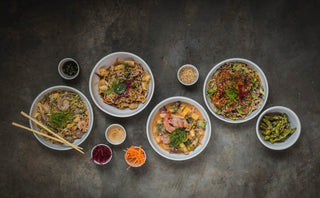In the West, dinner at 8pm is practically a lifestyle flex. You’ve worked all day, hit the gym, made plans — and now it’s time to dine. Late-night sushi, post-7pm pasta, maybe even dessert. No big deal, right?
In Traditional Chinese Medicine (TCM), this is where your digestion throws its tiny hands up in despair.
In Chinese culture, it’s not unusual to eat dinner at 5 or 6pm and it’s not just because Grandma gets up early. It’s because timing is everything, especially when it comes to how your body processes food. According to TCM’s organ clock, eating late is like sending guests into a restaurant after the kitchen’s already closed.
Here’s why eating early isn’t just a cultural habit — it’s an internal strategy for digestion, energy, and longevity.
Your Body Runs on a 24-Hour Energy Circuit
TCM teaches that your organs follow a natural rhythm, where each organ system is most active for a two-hour window. These windows are based on Qi flow — and when you eat matters just as much as what you eat.
From 5pm to 7pm, the Kidneys take the spotlight. And what do the Kidneys do in TCM? Everything important. They govern your essence (Jing), energy reserves, hormones, fertility, and aging. They're your body's battery pack.
So why eat at 5pm? Because by the time the Kidneys clock in, your digestion should already be winding down. You’re not meant to be processing a full steak and fries. You’re meant to be gently transitioning into rest and restoration mode.
The Stomach’s Workday Ends Early
The Stomach's peak time is 7–9am, and the Spleen (which helps digestion) peaks from 9–11am. This is when your metabolism is strongest. By late afternoon and evening, digestive fire starts to wane. Eating late means food sits longer, digests poorly, and can lead to symptoms like:
· Bloating
· Brain fog
· Poor sleep
· Weight gain
· Morning fatigue
Eating dinner around 5 or 6pm aligns with your body’s natural rhythm, allowing food to digest fully before bedtime. It’s not restrictive — it’s intelligent.
The “Mini-Fast” Your Hormones Crave
Eating early dinner = a natural overnight fast. TCM loves this. Not because it’s trendy, but because it gives your Liver time to detox, your Spleen time to recover, and your Kidneys time to preserve Jing.
It’s also incredibly calming for your nervous system. Eating late can keep your body in “on” mode for hours, delaying sleep, messing with blood sugar, and spiking cortisol. No thank you.
But Don’t Just Skip Dinner — Lighten It
TCM isn’t asking you to eat rice crackers and cry. The goal isn’t to eat nothing— it’s to eat lightly and early. Soups, congee, stir-fried greens, steamed fish — warming, gentle foods that nourish without overwhelming.
Save the heavier meals for lunch, when your digestion is stronger. At night, think of your digestion like a fire that's dying down. You can add a few sticks. Just don’t throw on a log.
The Bottom Line
Chinese people eat dinner early not out of discipline, but out of alignment. TCM teaches us that timing your meals with your organ clock supports digestion, hormones, sleep, and long-term vitality.
So if you're struggling with bloating, fatigue, or feeling wired at night — don’t just switch what’s on your plate. Try switching when you eat it. Your body might just thank you with clearer skin, better sleep, and a little extra glow.
Now if you’ll excuse me, it’s 5:01pm — and my congee is calling.





